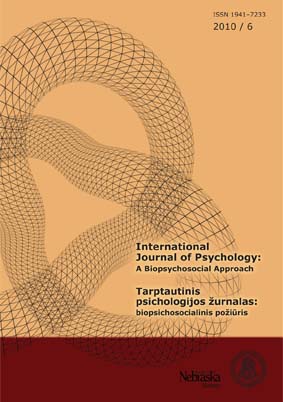Savivertės reikšmė suaugusiojo prieraišumo ir depresiškumo sąsajoms
The Influence of Self- Esteem on Adult Attachment and Depressiveness Interaction
Author(s): Birutė Balsevičienė, Liuda ŠinkariovaSubject(s): Psychology
Published by: Vytauto Didžiojo Universitetas
Keywords: suaugusiųjų prieraišumas; depresiškumas; savivertė; adult attachment; depressiveness; self-esteem
Summary/Abstract: Mokslinė problema, tikslas. Paskutiniais dešimtmečiais dažnai nagrinėjamas suaugusiųjų prieraišumo fenomenas ir jo problematika. Užsienio autoriai pastebi, kad šis fenomenas yra reikšmingai susijęs su emociniais sunkumais ar psichopatologija. Tačiau naujausi tyrimai rodo, jog vien prieraišumo ir emocinių sunkumų sąsajų nagrinėjimas nėra tikslingas – svarbiau nagrinėti prieraišumo, emocinių sunkumų ir kitų kintamųjų sąsajų modelius. Šio tyrimo tikslas – nustatyti savivertės įtaką suaugusiųjų prieraišumo ir depresiškumo sąsajoms. Metodikos: K. Brennano ir kt. (1998) suaugusiųjų prieraišumo skalė, W. W. K. Zungo depresijos skalė ir M. Rosenbergo savivertės skalė. Tiriamieji. Buvo ištirti 139 asmenys, iš jų 97 (69,8 %) moterys ir 42 (30,2 %) vyrai. Tiriamųjų amžiaus vidurkis 39,58±10,97. Rezultatai, išvados. Tyrimo rezultatai parodė, kad daugiausia tiriamųjų yra baimingojo vengiančiojo tipo – 33,1 %, vengiančiojo – 26,6 %, saugiojo ir neramiojo tipo – po 20,1 %. Background and Purpose. Recently there has been more and more researchnexamining adult attachment. It is important to notice that secure attachment is likely to be some kind of prevention of psychopathology and insecure attachment has increasingly been utilized as a powerful explanatory model for psychopathology. However, recently there is more research on the associations between attachment styles and depression to investigate related potential mediation in order to increase our understanding of the underlying processes involved. The aim of this study was to assess the influence of self-esteem on adult attachment and the interaction of depressiveness. The subjects of the study were 139 men and women (97 (69.8 %) women and 42 (30.2 %) men). The mean age of the subjects was 39.58±10.97. Method. These methods were used for investigation: Multi – Item Measure of Adult Attachment or The Experiences in Close Relationships scale (ECR) (Brennan et al., 1998); Zung depression inventory, (Zung et al., 1965); and The Rosenberg Self-Esteem Scale (Rosenberg, 1965). Results. The results of this study showed that most participants are disorganized attached 33.1 %, dismissing type – 26.6 %, and finally, save and preoccupied types – 20.1 %. The results also show that the individuals with the lowest self-esteem are the disordered attached participants. The most depressed are disordered attached and those who have low self-esteem. We have found that self esteem has an influence on depressiveness and attachment bonds. Self esteem explains 34.7 % of depressiveness and attachment connection.
Journal: Tarptautinis psichologijos žurnalas: biopsichosocialinis požiūris
- Issue Year: 2010
- Issue No: 6
- Page Range: 9-27
- Page Count: 19
- Language: Lithuanian

